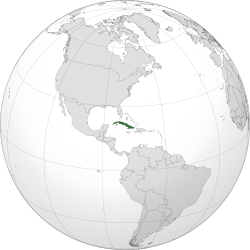
Mon–Sun: 8am – Midnight
Research Support
Mon–Fri: 8am – 5pm
Sat–Sun: By Appointment

Cuban literature is the literature written in Cuba or outside the island by Cubans in the Spanish language. It began to find its voice in the early 19th century. The major works published in Cuba during that time were of an abolitionist character. Notable writers of this genre include Gertrudis Gomez de Avellaneda and Cirilo Villaverde. Following the abolition of slavery in 1886, the focus of Cuban literature shifted. Dominant themes of independence and freedom were exemplified by José Martí, who led the modernista movement in Latin American literature. Writers such as the poet Nicolás Guillén focused on literature as social protest. Others, including Dulce María Loynaz, José Lezama Lima and Alejo Carpentier, dealt with more personal or universal issues. And a few more, such as Reinaldo Arenas and Guillermo Cabrera Infante, earned international recognition in the postrevolutionary era.
Most recently, there has been a so-called Cuban "boom" among authors born during the 1950s and '60s. Many writers of this younger generation have felt compelled to continue their work in exile due to perceived censorship by the Cuban authorities. Many of them fled abroad during the 1990s. Some well-known names include Daína Chaviano (USA), Zoé Valdés (France), Eliseo Alberto (Mexico), Pedro Juan Gutiérrez (Cuba), Antonio Orlando Rodríguez (Cuba) and Abilio Estévez (Spain).
Cuban literature is one of the most prolific, relevant and influential literatures in Latin America and all the Spanish-speaking world, with renowned writers including José Martí, Gertrudis Gómez de Avellaneda, José María Heredia, Nicolás Guillén (the National Poet of Cuba), José Lezama Lima, Alejo Carpentier (nominee for the Nobel Prize for Literature and previously the Premio Cervantes winner in 1977), Guillermo Cabrera Infante (Premio Cervantes, 1997), Virgilio Piñera and Dulce María Loynaz (Premio Cervantes, 1992), among many others.
Reference
Wikipedia. (2020, July 4). Cuban Literature retrieved from https://en.wikipedia.org/wiki/Cuban_literature

Cuba, officially the Republic of Cuba, is a country comprising the island of Cuba as well as Isla de la Juventud and several minor archipelagos. Cuba is located in the northern Caribbean where the Caribbean Sea, Gulf of Mexico and Atlantic Ocean meet.

The territory that is now Cuba was inhabited by the Ciboney Taíno people from the 4th millennium BC until Spanish colonization in the 15th century. From the 15th century, it was a colony of Spain until the Spanish–American War of 1898, when Cuba was occupied by the United States and gained nominal independence as a de facto United States protectorate in 1902. As a fragile republic, in 1940 Cuba attempted to strengthen its democratic system, but mounting political radicalization and social strife culminated in a coup and subsequent dictatorship under Fulgencio Batista in 1952. Open corruption and oppression under Batista's rule led to his ousting in January 1959 by the 26th of July Movement, which afterwards established communist rule under the leadership of Fidel Castro. Since 1965, the state has been governed by the Communist Party of Cuba. The country was a point of contention during the Cold War between the Soviet Union and the United States, and a nuclear war nearly broke out during the Cuban Missile Crisis of 1962. Cuba is one of a few extant Marxist–Leninist socialist states, where the role of the vanguard Communist Party is enshrined in the Constitution. Independent observers have accused the Cuban government of numerous human rights abuses, including short-term arbitrary imprisonment.

Culturally, Cuba is considered part of Latin America. It is a multiethnic country whose people, culture and customs derive from diverse origins, including the aboriginal Taíno and Ciboney peoples, the long period of Spanish colonialism, the introduction of African slaves and a close relationship with the Soviet Union in the Cold War. From 1962 until 1992, Cuba was officially an atheist Republic, openly and categorically hostile to religion.
Cuba is a sovereign state and a founding member of the United Nations, the G77, the Non-Aligned Movement, the African, Caribbean and Pacific Group of States, ALBA and Organization of American States. It has currently one of the world's only planned economies, and its economy is dominated by the tourism industry and the exports of skilled labor, sugar, tobacco, and coffee.
Reference
Wikipedia. (2020, July 4). Cuba retrieved from https://en.wikipedia.org/wiki/Cuba
 The Chase
by
Alejo Carpentier; Alfred MacAdam (Translator)
The Chase
by
Alejo Carpentier; Alfred MacAdam (Translator)